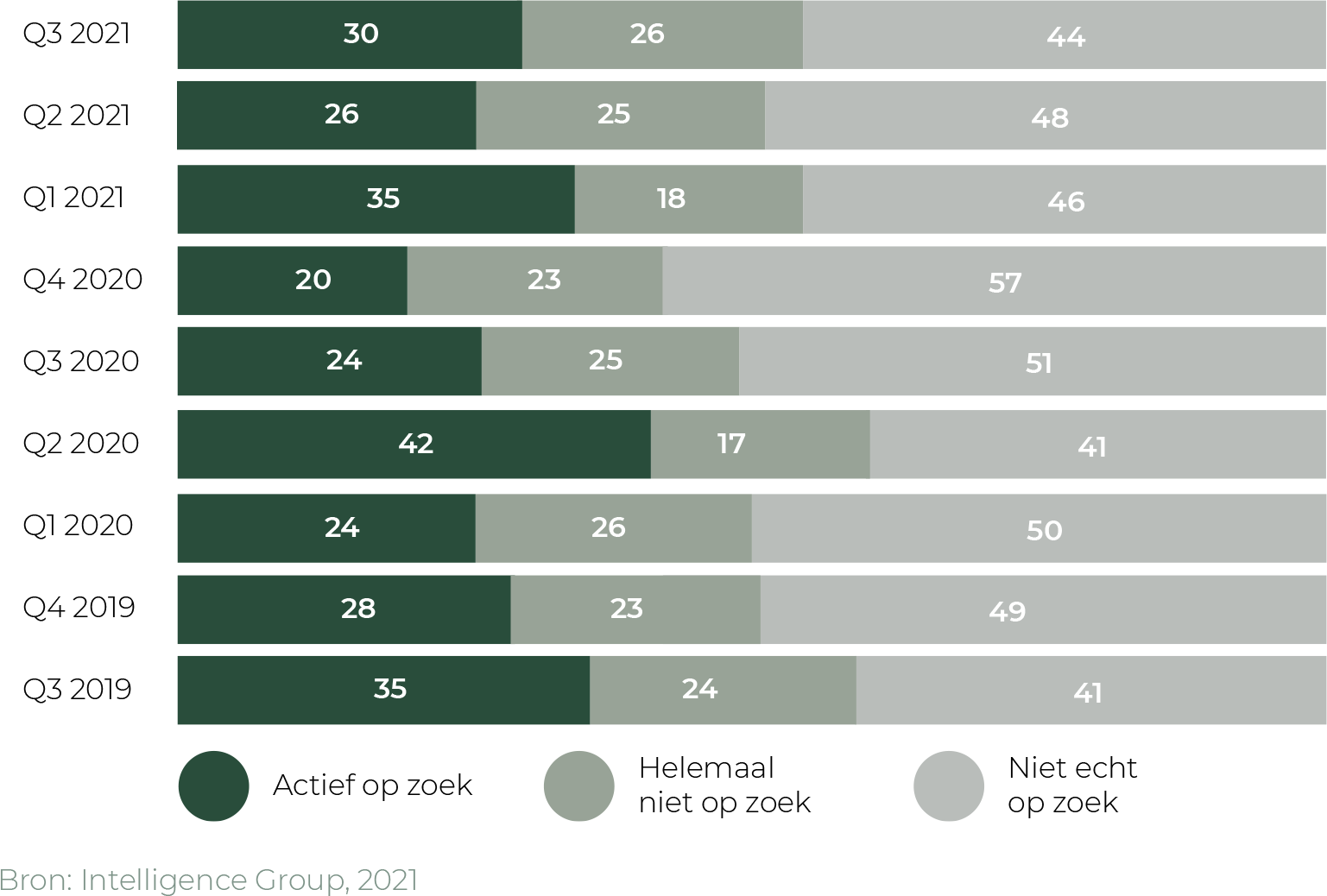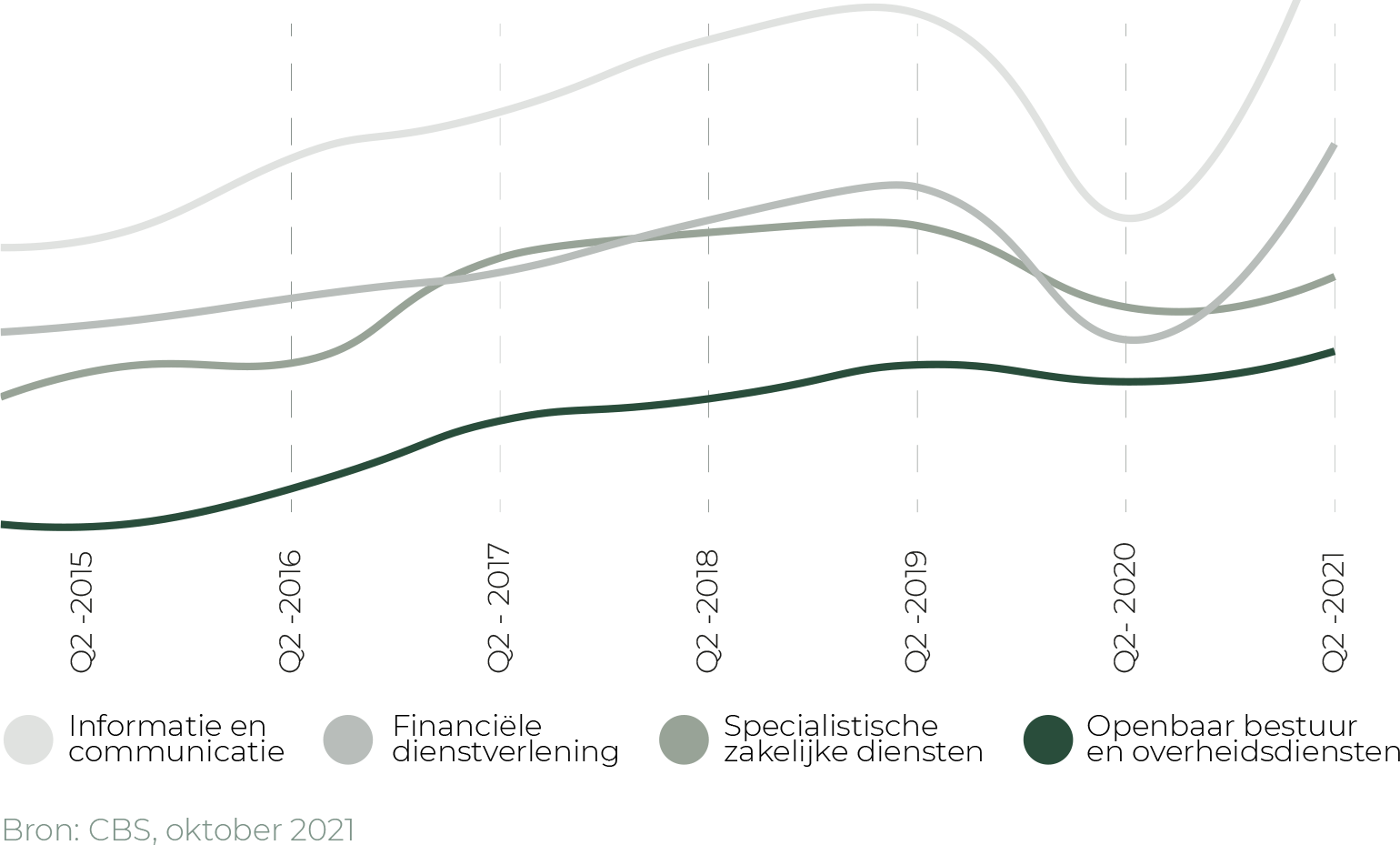Seventh 'Self-employment' progress letter: web module to next cabinet, limited enforcement extended

On Monday, September 20, the outgoing Minister of Social Affairs and Employment and the outgoing State Secretary of Finance informed the House of Representatives about the state of affairs and the follow-up steps regarding the measures envisaged in the coalition agreement in the field of "self-employment. This letter pays special attention to the pilot of the web module and the question of what follow-up will be given to this online tool. Attention is also paid to the enforcement moratorium and other relevant measures are briefly discussed.
Web module pilot evaluation
On Jan. 11, 2021, the pilot of the web module, an online questionnaire that clients can fill out anonymously in order to get more clarity on the nature of the employment relationship, began. The web module is aimed at business clients who hire a self-employed person for a particular assignment. Over 6,600 completed the web module in full. The totality of the results were distributed as follows:
- In 33.9% of cases, the completed questionnaire provided an indication of employment;
- An indication of fictitious employment in 9.7% of cases;
- In 28% of cases, an off-duty indication;
- And in 28.4% of cases, no indication could be given.
The results of the web module differ greatly between sectors. For example, in the construction, hospitality and transport sectors, the outcome 'indication within employment' is many times higher in percentage terms than in the public administration and business services sectors.
It has previously been indicated that a subsequent cabinet must decide whether the web module will actually be introduced and, if so, what status the outcome will have (legal certainty or not). Prior to making a decision, a test will be conducted into the implementation consequences for both the variant in which the web module is only used as an information tool and the variant in which it must offer (more) certainty to principals.
Intervention questionnaire not yet completed
In a previous progress letter it was announced that a questionnaire will also be developed specifically for situations of intervention. In the latest letter, the ministers indicate that it has proved complex to draw up a questionnaire for these situations. For this reason, the questionnaire for intervention has not yet been finalized. The Ministry of Social Affairs and Employment indicates in the letter that it intends to continue discussions with representatives of the intermediary industry to further discuss the possibility of a web module for intermediary services. Nevertheless, the organizations involved AWVN, PZO, Bovib, NBBU and I-ZO have let it be known that there is no point in discussing this or other variants of the web module further.
Supervision and enforcement
The Tax Administration supervises the qualification of the employment relationship for payroll taxes. This supervision, as previously indicated in previous progress letters, is a complex matter. Effective enforcement first requires amending laws and regulations. More specifically, this means reducing the differences between employees and the self-employed (for labor law, social security and taxation) and providing more clarity on the qualification of the employment relationship.
Furthermore, it becomes clear - in line with the Grinwis motion from just before the summer recess - that the moratorium will not expire on October 1, 2021, but will run at least until October 1, 2021, and that enforcement will not be initiated pending further decision-making. The Tax Office does still enforce against malicious principals.
Progress on mandatory disability insurance for self-employed workers
The Cabinet has previously indicated that it embraces the Labor Foundation's proposal, provided that it can be designed in a feasible and affordable manner. The Tax and Customs Administration and the UWV previously criticized the plans in view of their complexity and (un)feasibility. Together with social partners, work is currently continuing on the elaboration and design of such insurance. Given the caretaker status of the Cabinet and the controversial declaration of this subject by the Lower House, further decision-making will be left to the next Cabinet.
In conclusion
The government's commitment in recent years has been clear; to give genuine self-employed people as much space as possible to do business while at the same time offering protection to vulnerable self-employed people. As became clear earlier, the proposals of a legal minimum rate for the self-employed and a self-employed declaration have not been realized.
On the other hand, the cabinet did take steps to create a more level fiscal playing field between employees and the self-employed through the initiated phasing out of the self-employed deduction. This means that the self-employment deduction will go down in steps to €3240 by 2036.
Access to training and development opportunities should also contribute to a more level playing field. It was announced on Budget Day that the Subsidy Stimulus Labor Market Position (STAP) will also be available to self-employed people. Working and non-working people can apply for a maximum of €1000 per person for education, courses and training.
Politics trust zzp'ers gone, recognition needed

Highly educated zpp'ers give the trust relationship with national politics, on a scale of one to ten, a 4.6. This is evident from research by HR service provider HeadFirst Group, in which over two hundred independent professionals (zp'ers) participated. Underlying the low score are reasons such as doubts about expertise and the feeling of not being appreciated and poorly represented. Han Kolff, CEO at HeadFirst Group, takes the responsibility to contribute to the restoration of this trust: "Give self-employed people an independent place in the SER and start an accessible conversation with all types of self-employed people in the Netherlands. We like to play the connecting role to bring both worlds closer together."
Political trust historically low
Earlier research by the Social and Cultural Planning Office showed that confidence in politics fell sharply in the first six months of 2021. The stalled formation, the handling of the corona policy and the political aftermath of the allowance affair were at the root of this. These are also reasons often mentioned among self-employed people.
What plays a much bigger role for self-employed people, however, is the feeling that there is insufficient representation in the decision-making process. They experience that the traditional polder parties, such as trade unions and employers' organizations, are mainly listened to. In addition, self-employed people are annoyed by the fact that all types of self-employed people are lumped together and that politicians in The Hague have the wrong image of self-employed people: 'calculating self-employed people with tax advantages' instead of 'hard-working, passionate self-employed people who consciously choose entrepreneurship'. Finally, self-employed people doubt politicians' dossier knowledge and their ability to solve labor market issues. The lack of clarity and impracticability of laws and regulations for the self-employed, the DBA law in particular, was often mentioned as an example.
Building trust
Although the relationship of trust is under pressure, Kolff sees prospects for restoring it. An important point, which is in line with the "Outline Document" of the VVD and D66, is the representation and independent position of zzp'ers in the Social and Economic Council. "This gives zp'ers a central place in the decision-making process, so that interests can be better heard," Kolff explained.
In addition, he believes it is desirable to bring self-employed people in direct contact with MPs to share and discuss their concerns, entrepreneurial choices and practical bottlenecks. This knowledge exchange will have a positive effect on the information position and knowledge level of politicians. "Our core task as a labor market platform and service provider is to connect. We also like to fulfill this task between self-employed people and politicians, so that we can have a constructive debate together about the future of the Dutch labor market and the role of self-employed people therein," Kolff said.
About HeadFirst Group
HeadFirst Group is a leading, international HR service provider and specialist in the professional organization of permanent and flexible labor. The organization offers a diversity of HR solutions: Managed Service Providing, Recruitment Process Outsourcing, intermediary services (matchmaking, contracting) and HR consultancy. An average of fifteen thousand professionals work daily for over four hundred clients in Europe, with which HeadFirst Group realizes an annual turnover of over 1.5 billion euros. The main brands of HeadFirst Group are the intermediaries HeadFirst, Between and Myler, MSP service provider Staffing Management Services and RPO and recruitment specialist Sterksen.
Note to editors
Read the entire report 'The political trust of the independent professional by the yardstick'here.
Do you have any questions or comments in response to this press release? Feel free to contact Bart van der Geest, manager of marketing & communications at HeadFirst Group, reachable at 023 - 568 56 30 or bart.vandergeest@headfirst.nl.
Technology for optimal management of external talent (eBook)

Your organization has detailed insight into what it buys, from whom it buys, and what results it achieves. Where and how is the money being spent? What are the results? Where can they improve? Every company needs to be able to answer these questions about every resource it deploys. To do that, ZiPconomy and NextConomy, along with 6 partners, including HeadFirst Group, hosted a series of webinars on leveraging VMS technology to optimize the management of externally sourced talent. The reports and recordings from these sessions have now been compiled into a handy ebook.
Bringing transparency and thus getting a handle on unmanaged spending on hired talent and managing their suppliers is something that VMS technology is specifically designed for and that an MSP helps organizations with. As an end result, organizations get a more holistic view of who is already on board as well as who is needed in the future to contribute to the success of the organization. That transparency also enables organizations to deliberately do "good" for all workers, including hired talent: good communication, constructive relationships, commitment to the organization's mission of all workers, etc. Actively building relationships, even with those who are not on their own payroll, makes all the difference.
For those who want to take the first step towards this, namely creating transparency in the talent hired into the organization, VMS technology is indispensable. NextConomy and ZiPconomy have therefore created a handy questionnaire, a "self-scan" to help you zero in on this. Then they let experts in VMS technology and MSP service provider Staffing MS, part of HeadFirst Group, do the talking. Download the ebook here.
Talent Monitor: Hyperscarcity in the labor market
Talent Monitor: Hyperscarcity in the labor market
Where TTM and scarcity go hand in hand at the moment, a nice bridge - after the first edition of the Talent Monitor in the theme 'Total Talent Management' - to put the second edition entirely in the theme of 'scarcity'. We dive into this trend and provide unique insights based on Intelligence Group's recruitment data and HeadFirst Group's hiring data.
For the first time in history hyper-scarcity in the flex market
For a while, organizations were able to afford the luxury of filling the shortage of permanent employees with temporary, external professionals. Those days are over: the flexible labor market is also in short supply on all fronts. Read the entire press release here.


Zzp rates shoot up as inflation spikes
While inflation in the Netherlands is at its highest level in almost twenty years, a sharp dichotomy is emerging between the wages of employees and the rates of self-employed workers. The self-employed can demand considerably higher rates, while collective bargaining wages cannot keep up with price developments.
Main observations
- The proportion of active assignment seekers among self-employed workers is 26% and 30% in the last two quarters, meaning that nearly three-quarters are not looking for a new assignment, if at all.
- Assignments for highly skilled professionals receive five times fewer offers.
- Whereas in quarter 2, 71% of the highly educated and 58% of the low educated self-employed had fewer paid assignments due to corona, in the third quarter of 2021, the figure is only 27% (highly educated) and 47% (low educated).
- Sourcing pressure on self-employed to new record: nearly 7 out of 10 self-employed are approached at least once a quarter for an assignment.
- Rates of highly skilled self-employed workers are increasing from year to year between 3.5 - 7%. This increase seems to accelerate especially in the last quarters.
- Detachers respond with recruitment of new staff: 47% increase in number of vacancies between quarter 3 2020 and quarter 3 2021.
Partner

Download Talent Monitor
Previous editions
Nothing found.
Corona accelerates rise of self-employed workers

The employed Dutch workforce is modernizing, digitizing and flexibilizing at a rapid pace. Corona has been driving this further since last year, resulting in accelerated growth in the number of self-employed workers. This applies both to professions that were in high demand due to COVID-19, and to professions where the impact of the crisis was high. This is according to research by HR service provider HeadFirst Group and labor market data specialist Intelligence Group.
Growth of self-employed workers continues
Between 2018 and now, the Dutch labor force grew from 8.8 million to almost 9 million people. Currently, about 16.6 percent of them are self-employed. Partly due to COVID-19, the growth in the number of self-employed workers accelerated last year. There was a visible shift from staffing to hiring self-employed workers. In addition, the growth in the number of self-employed workers within a number of occupational groups was above average because of the additional demand created by COVID-19, such as construction workers, gardeners and welders. There were also many self-employed workers within a number of occupational groups where COVID-19 just hit hard, for example cooks. With their skills, they turned out to be able to earn a living in other ways, for example as home cooks, in catering or working flexibly for restaurants that have started delivering from home."
Scarcity felt by fixed and flex
A growth also caused by the corona crisis, but of a totally different nature, is that of automation, robotization and digitalization. From this there is more demand for specialized knowledge and creates a shortage of highly skilled professionals, especially in IT and engineering. This trend brings that organizations have a constant need for help in recruiting candidates and forces to start from the people themselves, for who they are and what they can do. That this involves a contractual commitment and payment thus becomes an afterthought.
Geert-Jan Waasdorp, director and founder Intelligence Group: "The economy is picking up quickly, but during this growth something else is also happening: the labor market is tilting completely and finding suitable talent is harder than ever. Previously, the flexible shell was used to make up for shortages on the permanent side. Now, self-employed and temporary workers are almost as scarce as permanent employees. A unique situation that has not occurred before."
Talent Monitor launch
With job openings rising to new records, it is expected that the traditional approach to dealing with scarcity will have to make way for data-driven and target group-oriented recruiting. Han Kolff, CEO HeadFirst Group: "More and more organizations are knocking on the door to work with data. With the aim: to compare their own performance against that of the market, in order to make informed decisions and optimize HR strategy."
To give direction to this, Intelligence Group and HeadFirst Group now provide unique quarterly insights on labor market related themes based on recruitment and hiring data in a new report called 'Talent Monitor'. In this report the state of the labor market, specifically the relationship and links between permanent and temporary staff, is accurately mapped and thus provides insight into the development around the integral management of personnel, in technical jargon also called Total Talent Management.
View the first edition of the Talent Monitor here.
About Intelligence Group
Intelligence Group is an International Data & Tech company in the field of labor market and recruitment data. Intelligence Group focuses on the collection, storage and enrichment of labor market related data for the purpose of improving the recruitment of personnel (or employees) by employers and the employability/labor market opportunities of employees. This data is made available to clients in a wide variety, via reports, dashboards and APIs.
About HeadFirst Group
HeadFirst Group is a leading, international HR service provider and specialist in the professional organization of permanent and flexible labor. The organization offers a diversity of HR solutions: Managed Service Providing, Recruitment Process Outsourcing, intermediary services (matchmaking, contracting) and HR consultancy. An average of fifteen thousand professionals work daily for over four hundred clients in Europe, with which HeadFirst Group realizes an annual turnover of over 1.5 billion euros. The main brands of HeadFirst Group are the intermediaries HeadFirst, Between and Myler, MSP service provider Staffing Management Services and RPO and recruitment specialist Sterksen.
Period of limited enforcement of DBA law does not end Oct. 1, 2021

Last Thursday, the House of Representatives met for the last time just before the summer recess to debate outgoing State Secretary Vijlbrief (Finance). Around midnight, MP Pieter Grinwis (ChristenUnie) tabled a motion asking the cabinet to provide more clarity on the enforcement moratorium - the period of limited enforcement - and the DBA law in the near future. With a large majority in favor of the motion, the House signaled its support for the content of the motion and its desire to first have a "reasonable and enforceable alternative to the DBA Act" before starting enforcement on false self-employment. Vijlbrief wanted to clarify something on this: "The enforcement moratorium does not end in October. It runs at least until October and then we will see what we will do." This echoes that the limited enforcement will be extended until there is clarity on an alternative to the DBA law, a reassurance for clients, self-employed workers and intermediaries.
Unrest in media
In recent weeks, several reports appeared in the press about ambiguity surrounding the DBA law. ZZP Nederland and PZO sent a fire letter to Vijlbrief on June 17 to make a decision on the enforcement moratorium in the short term. Research by HeadFirst Group also showed that, because of the approaching end of the enforcement moratorium, clients started to act risk-averse and looked more critically at the hiring of independent professionals, thereby terminating assignments of self-employed professionals prematurely and making it increasingly difficult for self-employed professionals to find assignments. This unrest and uncertainty - especially now that the Dutch economy is back in the starting blocks - is far from desirable, for self-employed professionals, clients and intermediaries alike.
Good move by Vijlbrief
In any case, the enforcement moratorium of the DBA law will not expire on October 1, 2021. The government intends to wait for the results of the web module pilot before making a decision on the enforcement moratorium and the introduction of new laws and regulations. This is in line with the earlier progress letter "Working as a self-employed person," which indicated that "the phasing out of the enforcement moratorium will be linked to the introduction of new legislation, which provides more clarity about the nature of the employment relationship. The market will also be given sufficient time to get used to new measures.'
We are still waiting for a clear and enforceable alternative to the DBA law, but for now we are pleased that the Secretary of State has received the signals and has taken this decision. Han Kolff, CEO at HeadFirst Group, is satisfied and relieved: "From signals we received from clients and freelancers it became clear that people were really ready for clarity and decision making from The Hague. Our research emphasized this with facts and figures. It is a wise choice that the enforcement moratorium remains in place until more is clear about the results of the web module pilot and replacement legislation for the DBA law. This gives the market more time to get used to new measures, gives zzp'ers more certainty to do business and gives politicians time to consider how best to proceed with enforcement. Great that this peace is being created and that we can start building new laws and regulations together."
Basic social system for all employed gains supporters among self-employed workers

Over 60 percent of highly educated self-employed people support a basic social system for all workers in the labor market. This is evident from research by HR service provider HeadFirst Group, in which over 1,700 self-employed professionals (zp'ers) recently participated. A wide support compared to the support for a compulsory disability insurance (AOV) for self-employed, where just 70 percent feels nothing for it. It makes Han Kolff, CEO at HeadFirst Group, feel positive. "We embrace the idea of creating a more level social playing field. Every individual in the Netherlands - regardless of the form of work and employment relationship - is entitled to protection and security."
Last month, the SER issued the advice to create a social safety net for the self-employed for special and unforeseen circumstances. Self-employed people should contribute to this themselves. Kolff goes a step further and advocates a basic provision for all employed people, as proposed in the social agreement between ONL, VZN and AVV. "Don't make the zzp'er an exception, but offer a broad safety net. We are moving towards a labor market in which the work is central, not the contract or legal form. Therefore, it is important to create securities that move with the challenges and changes people encounter in their working lives."
Security at the level of individual
Kolff is fed into this by the opinions of self-employed people. Research by HeadFirst Group shows that especially in the field of disability a basic system scores high: 61 percent are in favor. Sickness and unemployment has fewer supporters, but is certainly not excluded with 41 and 24 percent. "Solidarity among self-employed people is high. Still, I was surprised by the number of self-employed people willing to contribute to a basic social system, for disability in particular. If in this way we can protect the needy self-employed and leave the rest free to do business, then we are really taking a step in the right direction. It is up to the new cabinet to pick up this gauntlet and get serious about this," Kolff stressed.
Support for compulsory AOV low
The SER also announced its adherence to the agreement in the Pension Agreement to make it compulsory for self-employed persons to have insurance against disability to prevent unfair competition and large income risks for individuals. In March last year, the Labor Foundation came up with a proposal for the implementation of compulsory AOV. This proposal drew criticism from self-employed individuals' organizations. The Tax and Customs Administration and the UWV also informed outgoing Minister Koolmees that they had doubts about the technical implementation. Yet it seems that the plan is not yet off the table. However, the government cannot count on the support of self-employed workers; only 30 percent are positive.
Half of self-employed workers have nothing arranged
Currently, half of the self-employed have covered the risks of occupational disability themselves - for example, through a private party or a mutual fund. The most important reason for self-employed workers to take out insurance is that they are unwilling (53 percent) or unable (21 percent) to bear the financial risk themselves. Another 16 percent cannot fall back on their partner's income. Of the self-employed who have not taken out disability insurance, 35 percent say they can bear the financial risk. Furthermore, one in five feels the costs do not outweigh the benefits and 11 percent consider the risk of disability low.
About HeadFirst Group
HeadFirst Group is a leading, international HR service provider and specialist in the professional organization of permanent and flexible labor. The organization offers a diversity of HR solutions: Managed Service Providing, Recruitment Process Outsourcing, intermediary services (matchmaking, contracting) and HR consultancy. An average of fifteen thousand professionals work daily for over four hundred clients in Europe, with which HeadFirst Group realizes an annual turnover of over 1.5 billion euros. The main brands of HeadFirst Group are the intermediaries HeadFirst, Between and Myler, MSP service provider Staffing Management Services and RPO and recruitment specialist Sterksen.
Note to editors
All outcomes of the study have been compiled into aninfographic.
Do you have any questions or comments in response to this press release? Feel free to contact Bart van der Geest, manager of marketing & communications at HeadFirst Group, reachable at 023 - 568 56 30 or bart.vandergeest@headfirst.nl.
HeadFirst Group boosts sustainable employability among self-employed with launch of Select Academy

HR services provider HeadFirst Group is launching an initiative to boost sustainable employability of independent professionals (zp'ers): Select Academy. With this it facilitates zp'ers in personal development and continuous learning. "The direction on development naturally remains with the entrepreneur, at the same time we take the responsibility to make 'lifelong learning' easily accessible," said Han Kolff, CEO at HeadFirst Group.
Sustainable employability
"Jobs are disappearing, processes are being automated and digitized and the required skills are changing rapidly. All the more important to invest as a worker in the targeted development of knowledge and skills in order to be able to continue to add value to a work or client on a continuous basis," Kolff professes.
People in self-employment who consciously choose entrepreneurship work significantly less on their sustainable employability compared to employees in permanent employment, according to a report commissioned by the Dutch Parliament on obstacles to lifelong development. People who are self-employed are intrinsically motivated to develop themselves, but they mainly rely on existing professional knowledge and experience and 'learning on the job'. Kolff: "Most self-employed people are highly educated and have extensive work experience which they use for projects. Development 'on the job' is what they do every day, that is where the basis is formed, but supplementing knowledge with education and training is necessary. With Select Academy we make personal development more attractive. Naturally, the control remains with the self-employed, they became entrepreneurs for a reason, but as a market-leading HR service provider, we consider it our task to make continuous learning as attractive as possible in order to send professionals forward to their next dream role."
Select Academy: 9,000+ substantive training courses
The training environment, realized by HeadFirst Group in exclusive cooperation with the continuous learning platform MyCademy, offers the most complete offering in the Netherlands: 9,000+ professional training courses from more than 120 'world leading' providers in the fields of IT, management and finance, among others. Professionals can take unlimited online courses, virtual labs and knowledge sessions in Select Academy at any time. In addition, they can test their knowledge by taking mock exams.
Select Academy has been made available for zp'ers, who use our Professionals services. From July 2021, the environment will also be ready for suppliers of HeadFirst Group, such as secondment and consultancy companies.
Professionals & Partners services
The subscription 'unlimited online learning' in Select Academy is one of the advantages of the Professionals & Partners services of HeadFirst Group. Besides the possibility to acquire challenging assignments through HeadFirst Group, freelancers and suppliers of professionals can use the services for administrative support, accelerated payment of invoices, group discount on various insurances and from now on more benefits in the field of personal development.
"This unique package of services forms a one-stop-shop for entrepreneurs, with which HeadFirst Group ensures that professionals can do business worry-free. In doing so, we actively contribute to our clients' 'being a good client' and collectively ensure that the best professionals want to work on an assignment with them," Kolff explains.
About HeadFirst Group
HeadFirst Group is a leading, international HR service provider and specialist in the professional organization of permanent and flexible labor. The organization offers a diversity of HR solutions: Managed Service Providing, Recruitment Process Outsourcing, intermediary services (matchmaking, contracting) and HR consultancy. An average of fifteen thousand professionals work daily for over four hundred clients in Europe, with which HeadFirst Group realizes an annual turnover of over 1.5 billion euros. The main brands of HeadFirst Group are the intermediaries HeadFirst and Between, MSP service provider Staffing Management Services and RPO and recruitment specialist Sterksen.
Note to editors
Do you have any questions or comments in response to this press release? Feel free to contact Bart van der Geest, manager of marketing & communications at HeadFirst Group, reachable at 023 - 568 56 30 or bart.vandergeest@headfirst.nl.
HeadFirst Group rocks at second spot in Flex Market Turnover Ranking Top-100 2021

HeadFirst Group is rock solid in second place in the Flexmarkt Turnover Ranking Top-100 2021 published last week. The prestigious ranking lists the hundred largest flex companies in the Netherlands based on their turnover in 2020. With revenues of over 1.5 billion euros, HeadFirst Group strengthens its position as the largest intermediary and MSP service provider in the Benelux and permanent Top 3 player in the overall flex market.
HeadFirst Group and Between Staffing Group, listed separately but part of HeadFirst Group since November 2020, achieved gross sales of 1.515 billion euros. A strong result, especially in an eventful year like 2020. Vincent van der Mark, CFO at HeadFirst Group: "The organizations achieved 2% organic revenue growth, in a year in which we were confronted with the coronavirus. That makes us incredibly proud. In 2019, we reached the €1 billion revenue milestone for the first time and have been steaming ahead strongly ever since. Due to our diverse portfolio of clients and strong presence in the niche of highly skilled professionals, including many IT professionals, the impact of the coronavirus has been limited."
Full service HR service provider
In 2020, HeadFirst Group made the transition to full service HR service provider by developing as an advisor to clients on recruitment and hiring issues. "We offer data-driven solutions to optimize and future-proof the recruitment process of personnel - flex and permanent," says Han Kolff, CEO at HeadFirst Group.
This has led to demonstrable success. Existing large master contracts have been extended and new European tender procedures won at, among others, Ministry of the Interior and Kingdom Relations, Ministry of Justice and Security, Ministry of Education, Culture and Science, Municipality of Schiedam and Leiden University Medical Center Leiden. "The new clients we have welcomed are great news for the independent professionals and suppliers in our network. All open assignments appear on Holland's largest assignment platform: Select.
Top 10 Flex Market Turnover Rankings Top-100 2021
Source: Flexmarkt.co.uk
About Flexmarkt Turnover Ranking Top-100
The Flexmarkt Turnover Ranking Top-100 is published annually by Flexmarkt in cooperation with Corporate Finance International (CFI). The Turnover Ranking provides an overview of flex companies, from small to large, with diverse forms of services in staffing and hiring. In addition to staffing agencies, it includes numerous payroll companies, as well as secondment companies, zzp intermediaries and MSP service providers. This leading ranking covers more than half of the total Dutch flex industry in terms of turnover and thus provides a clear, representative picture of developments in the market.
About HeadFirst Group
HeadFirst Group is a leading, international HR service provider and specialist in the professional organization of permanent and flexible labor. The organization offers a diversity of HR solutions: Managed Service Providing, Recruit Process Outsourcing, intermediary services (matchmaking, contracting) and HR consultancy. An average of fifteen thousand professionals work daily for over four hundred clients in Europe, with which HeadFirst Group realizes an annual turnover of over 1.5 billion euros. The main brands of HeadFirst Group are the intermediaries HeadFirst, Between and Myler, MSP service provider Staffing Management Services and RPO and recruitment specialist Sterksen.
For further information
Do you have any questions or comments following this post? Please contact Bart van der Geest, manager of marketing & communications at HeadFirst Group, at 023 - 568 56 30 or bart.vandergeest@headfirst.nl.
Zzp'ers miss out on assignments due to dormant DBA issue

More than half of highly skilled self-employed professionals are finding it harder to find assignments since the introduction of the DBA law in 2016, introduced at the time to better protect precisely vulnerable self-employed people. This is according to a survey by HR service provider HeadFirst Group, in which over 1,700 self-employed professionals (zp'ers) recently participated. "It is imperative that politicians immediately extend the current period of limited enforcement to prevent further negative consequences for highly skilled self-employed professionals and clients," stated Han Kolff, CEO at HeadFirst Group.
Lack of clarity about DBA law hinders more and more clients and self-employed workers
Since the introduction of the DBA law, there has been much to do about it. After its introduction the law was quickly frozen, because in a short time there was much unrest among clients, who started to hire fewer self-employed workers. Since then, new legislation has been worked on and, in the meantime, a limited enforcement policy applies. As the research of HeadFirst Group now shows, the negative effects of the legislation for self-employed workers are still present and even increasing.
More than 55 percent of independent professionals experience that clients look more critically at zp'ers now when hiring externally than they did a year ago, the survey found. Recent examples in the press of clients putting their zp hiring under strict scrutiny support this view. In practice, assignments for which clients are looking for an external professional are increasingly indicating "no self-employed person may respond to this assignment. This makes it more difficult for more than half of the self-employed to find assignments, it turns out. So currently hundreds of thousands of self-employed people are experiencing hindrance. This is in addition to the self-employed, nearly 40 percent, whose assignments have been terminated prematurely by the client in recent years due to concerns and lack of clarity surrounding the legislation.
Han Kolff, CEO at HeadFirst Group: "That clients are looking critically at hiring self-employed professionals for roles where perhaps someone in permanent employment would make more sense is good. But there is no reason to panic, as replacement legislation is going to come. However, the date of Oct. 1, 2021 - when the current limited enforcement ends - is getting closer, causing many organizations to tighten their belts around zp'ers. This was to be expected. Large clients are acting risk-averse, and blame them. The key lies with politics."
Solution: continue enforcement freeze
The negative consequences are twofold: self-employed workers see work evaporate and clients, who already have a hard time recruiting good professionals due to scarcity on the labor market, risk having to sideline an important target group with valuable knowledge. Han Kolff: "As an intermediary on the labor market we can adapt to legislation and customer requirements, but customers and self-employed workers - our customers - are directly affected by the current situation. We stand up for the interests of our clients."
The SER recently suggested maintaining below the EUR 30-35 limit. Kolff: "An excellent limit, which gives the professionals above it - and the clients who hire them - peace of mind and room to do business. My appeal on behalf of clients and freelancers: continue the current limited enforcement until there is new, clear legislation from a new cabinet. And get on with it now; the market has been craving that clarity for years."
About HeadFirst Group
HeadFirst Group is a leading, international HR service provider and specialist in the professional organization of permanent and flexible labor. The organization offers a diversity of HR solutions: Managed Service Providing, Recruitment Process Outsourcing, intermediary services (matchmaking, contracting) and HR consultancy. An average of fifteen thousand professionals work daily for over four hundred clients in Europe, with which HeadFirst Group realizes an annual turnover of over 1.5 billion euros. The main brands of HeadFirst Group are the intermediaries HeadFirst, Between and Myler, MSP service provider Staffing Management Services and RPO and recruitment specialist Sterksen.
Note to editors
All outcomes of the study have been compiled into aninfographic.
Do you have any questions or comments in response to this press release? Feel free to contact Bart van der Geest, manager of marketing & communications at HeadFirst Group, reachable at 023 - 568 56 30 or bart.vandergeest@headfirst.nl.











